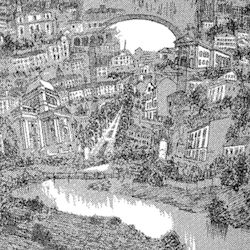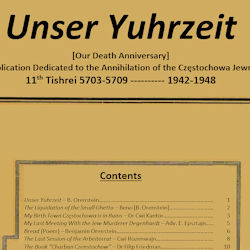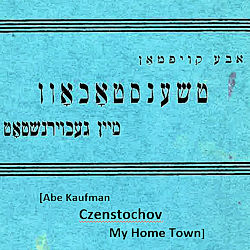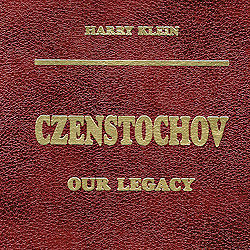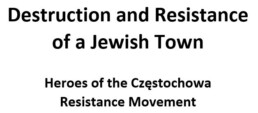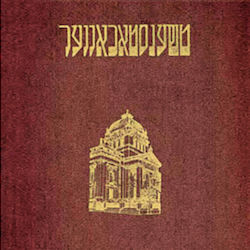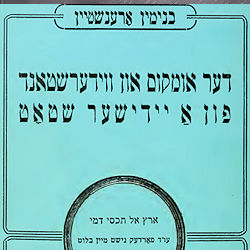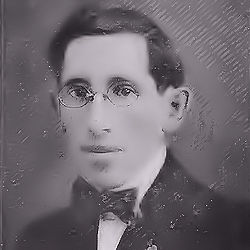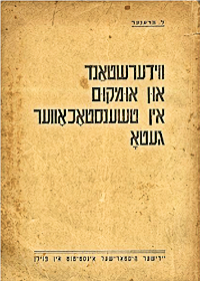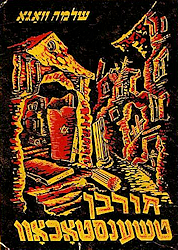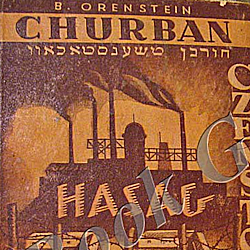From the Warta River to the East River (1957)
"From the Warta River to the East River" (1957)
- by Rafał Federman
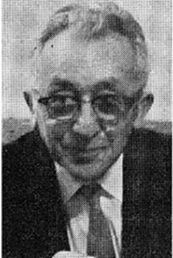 Born, raised and having spent most of his life in Częstochowa, Rafał Federman was a Yiddish writer and journalist. He served as Vice-Chairman of the American section of the World Federation of Polish Jews and was President of the United Czenstochower Relief Committee. He lived in both Poland and the U.S.A. He was a prolific contributor to several Częstochowa Yizkor Books.
Born, raised and having spent most of his life in Częstochowa, Rafał Federman was a Yiddish writer and journalist. He served as Vice-Chairman of the American section of the World Federation of Polish Jews and was President of the United Czenstochower Relief Committee. He lived in both Poland and the U.S.A. He was a prolific contributor to several Częstochowa Yizkor Books.
According to S. D. Singer:
“Rafał Federman’s memoirs printed in the book ‘Czenstochover Yidn’, were very interesting to read. It was evident, from those autobiographical pages, that Federman had much more to relate.
“Federman, therefore, had a good idea when he decided to elaborate on his memoirs. In fact, he re‐wrote and changed [them] such that a completely new and unique book emerged. This is a cultural‐historical chronicle of the life of a man, written in the form of a long story, with a protagonist ‐ Josef Szalit ‐ and with descriptions of dozens of other Jewish personalities.”
In fact, in the preface to this book, Federman, himself, writes:
“It is with an uneasy feeling that I bring this book, ‘From the Warta River to the East River’, before the reader. My sole intention was to record a chronicle of the times and the environs in which I lived for over sixty years. I thought that, at least, some of my experiences and those of my friends should be recorded somewhere.
“However, not all that I recount here has to do solely with suffering. It was also a life filled with joy, as well as hardships and stumbles.”
While the book’s protagonist and characters are fictitious, the reader should be aware that their experiences and the events described are based in truth.
This Yizkor book, in its entirety, has been professionally translated into English
for the FIRST time.
The professional English translation of this Yizkor book has been made possible by the financial support of the
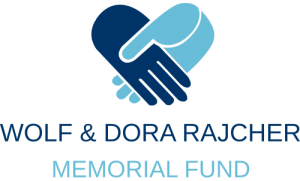
Wolf Rajcher z”l and Dora Rajcher z”l were both Holocaust survivors from Częstochowa.
They were prisoners in both the “Big Ghetto” and the “Small Ghetto” and, until liberation, were slave labourers in HASAG-Pelcery. Following the War, they emigrated to Melbourne Australia.
Upon the passing of both his parents, their son, Andrew Rajcher, established this charitable fund in their memory.
Chapters/articles are listed in the order in which they appear in the Yizkor Book.
(The numbers in brackets, after each article, correspond to the appropriate page numbers in the Yizkor Book.)
Part 1 – BY THE WARTA RIVER
Part 2 – BY THE EAST RIVER
EPILOGUE
In 1964, in the periodical “Zayn”, Rafał Federman published an addendum to his book entitled
BY THE EAST RIVER (TRANSFORMATION)
ENGLISH TRANSLATION:
Dave Horowitz-Larochette
IMPORTANT NOTICE
While the English translation is available for download, it may not, either in part or as a whole, be distributed or published without the prior written permission of Andrew Rajcher, the copyright-holder of this English-language version of the Yiddish Section of this Yizkor Book.
Unser Yuhrzeit (1948)
Unser Yuhrzeit (1948)
- published by the Central Administration of the Częstochower Landsmannschaft in the American Zone in Germany
For a long time, we have known about this booklet. Also, for a long time, we searched for a scan or copy of it – but without success.
By sheer coincidence, we discovered that a copy of it was held by the U.S. Library of Congress, whom we thank for scanning it especially for this Project.
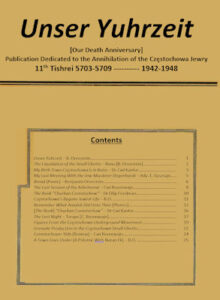 Following liberation at the end of World War II, many Holocaust survivors found themselves in the American Zone of Germany. Many Polish Jews stayed there while they awaited permits to emigrate to other countries.
Following liberation at the end of World War II, many Holocaust survivors found themselves in the American Zone of Germany. Many Polish Jews stayed there while they awaited permits to emigrate to other countries.
This was not a speedy process and many of them waited for a few years until they could find a new home.
Just as they created or joined in their new home countries, landmannschaften were also formed in the German Displaced Persons camps and in other places.
Their purpose was to unite survivors from the same region, city or town. Through them, survivors could learn who had survived, what had happened to their hometown and, most importantly, find comfort, strength and support in mourning the loss of their loved ones.
In 1948, marking the sixth anniversary of the deportations of Jews from Częstochowa, the Central Administration of the Częstochower Landsmannschaft in the American Zone in Germany held a Yizkor ceremony, for which this booklet was published.
In translating this Yizkor Book, every effort has been made to translate, as accurately as possible, the Yiddish text and to transliterate (and double-check) the names of people and places as they would have been spelt in a historically, accurate manner (surnames may have been changed post-War). This includes the use of Polish diacritics where appropriate.
(Such care and research may not have been carried out in translations of this Yizkor Book appearing elsewhere.)
PLEASE NOTE: A great number of people are mentioned in this book. If any of these landsleit have relatives, who were in the Landsmannschaften, please email us if the spelling of their name is incorrect.
This Yizkor book, in its entirety, is being professionally translated into English
for the FIRST time.
The professional English translation of this Yizkor book has been made possible by the financial support of the

Wolf Rajcher z”l and Dora Rajcher z”l were both Holocaust survivors from Częstochowa.
They were prisoners in both the “Big Ghetto” and the “Small Ghetto” and, until liberation, were slave labourers in HASAG-Pelcery. Following the War, they emigrated to Melbourne Australia.
Upon the passing of both his parents, their son, Andrew Rajcher, established this charitable fund in their memory.
Chapters/articles are listed in the order in which they appear in the Yizkor Book.
(The numbers in brackets, after each article, correspond to the appropriate page numbers in the Yizkor Book.)
ENGLISH TRANSLATION:
Dave Horowitz-Larochette
IMPORTANT NOTICE
While the English translation is available for download, it may not, either in part or as a whole, be distributed or published without the prior written permission of Andrew Rajcher, the copyright-holder of this English-language version of the Yiddish Section of this Yizkor Book.
Częstochowa - My Home Town (1950)
Częstochowa - My Home Town (1950)
- by Aba Kaufman
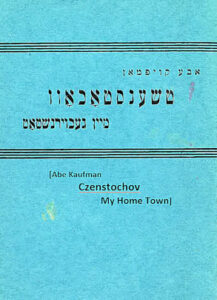 This Yizkor Book of memoirs, written by Aba Kaufman, was published in New York, in 1950. It was published by Joseph Kaufman.
This Yizkor Book of memoirs, written by Aba Kaufman, was published in New York, in 1950. It was published by Joseph Kaufman.
A feature of this book is an index of several hundred names of those born in Częstochowa, who were victims of the Nazis.
Not a great deal is known about the author. In the Yizkor Book, “Czenstochov” (1958), Dr. W. Gliksman writes the following about him:
“Aba was the classical type of ‘landsmann’ who maintained, in addition to the physical one, a spiritual connection also with the ‘Old Home’. For him, in his lonely life, being a ‘landsmann’, became an ideal which he quite literally practised at every opportunity day‐to‐day.
He had his unique ways and manners of bringing the duty of a ‘landsmann’ from theory into practice. He never lost the foundation of maintaining his ties with his birthplace.”
Gliksman goes on to say:
“His plan, to publish a collection of names of Częstochowa landsleit victims of Nazism, serves as an example. Aba, peace be upon him, gave Jewish people back the names that the Germans had desired to erase from this earth.”
In translating this Yizkor Book, every effort has been made to translate, as accurately as possible, the Yiddish text and to transliterate (and double-check) the names of people and places as they would have been spelt in a historically, accurate manner (surnames may have been changed post-War). This includes the use of Polish diacritics where appropriate.
(Such care and research may not have been carried out in translations of this Yizkor Book appearing elsewhere.)
PLEASE NOTE: A great number of people are mentioned in this book. If any of these landsleit have relatives, who were in the Landsmannschaften, please email us if the spelling of their name is incorrect.
This Yizkor book, in its entirety, has been professionally translated into English
for the FIRST time.
The professional English translation of this Yizkor book has been made possible by the financial support of the

Wolf Rajcher z”l and Dora Rajcher z”l were both Holocaust survivors from Częstochowa.
They were prisoners in both the “Big Ghetto” and the “Small Ghetto” and, until liberation, were slave labourers in HASAG-Pelcery. Following the War, they emigrated to Melbourne Australia.
Upon the passing of both his parents, their son, Andrew Rajcher, established this charitable fund in their memory.
Chapters/articles are listed in the order in which they appear in the Yizkor Book.
(The numbers in brackets, after each article, correspond to the appropriate page numbers in the Yizkor Book.)
ENGLISH TRANSLATION:
Dave Horowitz-Larochette
IMPORTANT NOTICE
While the English translation is available for download, it may not, either in part or as a whole, be distributed or published without the prior written permission of Andrew Rajcher, the copyright-holder of this English-language version of the Yiddish Section of this Yizkor Book.
Czenstochov - Our Legacy (1993)
Czenstochov - Our Legacy (1993)
- a Memorial Book edited and published by Harry Klein
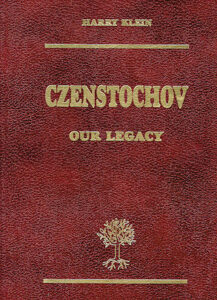 This Yizkor Book was published in Montreal, in 1993, edited and published by Harry Klein.
This Yizkor Book was published in Montreal, in 1993, edited and published by Harry Klein.
It tells the story of the first and second generations of Holocaust Survivors in Częstochowa Jewish communities in the United States of America and in Canada.
In the book’s preface, Harry Klein writes,
With every passing year, there are fewer survivors of the Holocaust. Their unique ability to testify about the horrors of the Nazi crimes disappears as they die. Their children play an increasingly significant role in perpetuating the memory of that terrible past .
This statement, made by Harry Klein in 1993, carries even more meaning today.
Harry Klein ends his preface with,
Recounting any facet of the Holocaust is not a pleasant task. Hitler and his henchmen went on a rampage of mass murder.Yet, the world did not stop them. The world looked on. This ought to be one of the most powerful lessons we learned. It must never happen again!
According to our Częstochowa Yizkor Book Project coordinator, Andrew Rajcher:
In total, this book contains almost 480 pages, most of which are in English. Only the last 117 pages comprise “The Yiddish Section” – it is only those pages which, when translated into English, will appear in this section of the Częstochowa Yizkor Book Project.
To view the entire book (both Yiddish and English sections), click HERE.
In translating this Yizkor Book, every effort has been made to translate, as accurately as possible, the Yiddish text and to transliterate (and double-check) the names of people and places as they would have been spelt in a historically, accurate manner (surnames may have been changed post-War). This includes the use of Polish diacritics where appropriate.
(Such care and research may not have been carried out in translations of this Yizkor Book appearing elsewhere.)
PLEASE NOTE: A great number of people are mentioned in this book. If any of these landsleit have relatives, who were in the Landsmannschaften, please email us if the spelling of their name is incorrect.
This Yizkor book, in its entirety, has been professionally translated into English
for the FIRST time.
The professional English translation of this Yizkor book has been made possible by the financial support of the

Wolf Rajcher z”l and Dora Rajcher z”l were both Holocaust survivors from Częstochowa.
They were prisoners in both the “Big Ghetto” and the “Small Ghetto” and, until liberation, were slave labourers in HASAG-Pelcery. Following the War, they emigrated to Melbourne Australia.
Upon the passing of both his parents, their son, Andrew Rajcher, established this charitable fund in their memory.
Chapters/articles are listed in the order in which they appear in the Yizkor Book.
(The numbers in brackets, after each article, correspond to the appropriate page numbers in the Yizkor Book.)
ENGLISH TRANSLATION:
Dave Horowitz-Larochette
IMPORTANT NOTICE
While the English translation is available for download, it may not, either in part or as a whole, be distributed or published without the prior written permission of Andrew Rajcher, the copyright-holder of this English-language version of the Yiddish Section of this Yizkor Book.
Czenstochover Landsmanshaft of Montreal (1966)
Czenstochover Landsmanshaft of Montreal (1966)
Memorial Book
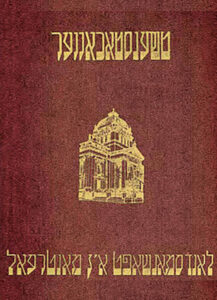 This Yizkor Book was published in Montreal, in 1966, by the Czenstochover Landmannshaft of Montreal.
This Yizkor Book was published in Montreal, in 1966, by the Czenstochover Landmannshaft of Montreal.
The organisation can trace its origins back to 16th December 1945, when it was established by longstanding residents of Montreal, who had a profound sentiment for their city which had been destroyed and who wished to support the Survivors. The name of the organisation was then the “Czenstochover Regional Aid Society in Montreal”.
With the post-War stream of immigration to Canada, many landsleit among them, the Society’s work was reorganised, under the new name of the “Czenstochover Society [Landsmannschaft] Montreal”.
According to this Yizkor Book’s introduction:
This book contains historical treatises, documents, testimonies taken from miraculously-saved landsleit, and descriptions of the communal and cultural life of our bygone, cherished Częstochowa. There are essays here about institutions, personalities, outstanding people and common Jews ….
According to our translator David Horowitz-Larochette:
Much of the information found here will probably be completely new. It is not just a re-write of previous Yizkor Books, with an emphasis on Montreal, but it actually provides a great many, new details and insights.
In translating this Yizkor Book, every effort has been made to translate, as accurately as possible, the Yiddish text and to transliterate (and double-check) the names of people and places as they would have been spelt in a historically, accurate manner (surnames may have been changed post-War). This includes the use of Polish diacritics where appropriate.
(Such care and research may not have been carried out in translations of this Yizkor Book appearing elsewhere.)
PLEASE NOTE: A great number of people are mentioned in this book. If any of these landsleit have relatives, who were in the Montreal Landsmannschaft, please email us if the spelling of their name is incorrect.
This Yizkor book, in its entirety, has been professionally translated into English
for the FIRST time.
The professional English translation of this Yizkor book has been made possible by the financial support of the

Wolf Rajcher z”l and Dora Rajcher z”l were both Holocaust survivors from Częstochowa.
They were prisoners in both the “Big Ghetto” and the “Small Ghetto” and, until liberation, were slave labourers in HASAG-Pelcery. Following the War, they emigrated to Melbourne Australia.
Upon the passing of both his parents, their son, Andrew Rajcher, established this charitable fund in their memory.
Click on SECTION HEADINGS to reveal chapters.
Chapters/articles are listed in the order in which they appear in the Yizkor Book.
(The numbers in brackets, after each article, correspond to the appropriate page numbers in the Yizkor Book.)
HISTORY and ACTIVITIES
ENGLISH TRANSLATION:
Dave Horowitz-Larochette
IMPORTANT NOTICE
While the English translation is available for download, it may not, either in part or as a whole, be distributed or published without the prior written permission of Andrew Rajcher, the copyright-holder of this English-language version of this Yizkor Book.
Destruction and Resistance of a Jewish Town (1949)
Destruction and Resistance of a Jewish Town (1949)
by Dr. Benjamin Orenstein
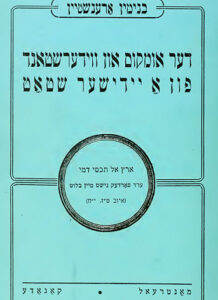 This Yizkor Book, by Dr. Benjamin Orenstein, was published in Montreal in 1949, very soon after he arrived in Canada from post-War Germany.
This Yizkor Book, by Dr. Benjamin Orenstein, was published in Montreal in 1949, very soon after he arrived in Canada from post-War Germany.
While this Yizkor Book is only twenty pages long, thereby qualifying more as a “booklet”, it seems to have been often overlooked. Nevertheless, it earns a place within our Project because of the statistics that it contains and because of its author.
Orenstein, in various publications, became a prolific chronicler of events, relating to Częstochowa Jewry, both during and after the Holocaust.
According to his entry in “Częstochowa Jews – A Biographical Dictionary”(Częstochowa, 2019): Benjamin Orenstein,
“… soon left Germany and, on 28th October 1948, he came to Canada and settled in Montreal, where there were many Częstochowa Jews in a very active community.
He was soon elected as the chairman of the local Częstochowa landsmannschaft, later also serving as its general secretary.”
Orenstein is passionate in his commitment to ensuring that the memory of those Częstochowa Jews, who perished in the Holocaust, should be immortalised for posterity. At the end of the introduction to this booklet, he says,
“Oh, you brothers and sisters who have fallen in the active and passive struggle – I immortalise your sacred memory with the blood of my heart!“
This Yizkor book, in its entirety, has been professionally translated into English.
The professional English translation of this Yizkor book has been made possible by the financial support of the

Wolf Rajcher z”l and Dora Rajcher z”l were both Holocaust survivors from Częstochowa.
They were prisoners in both the “Big Ghetto” and the “Small Ghetto” and, until liberation, were slave labourers in HASAG-Pelcery. Following the War, they emigrated to Melbourne Australia.
Upon the passing of both his parents, their son, Andrew Rajcher, established this charitable fund in their memory.
ENGLISH TRANSLATION:
Dave Horowitz-Larochette
IMPORTANT NOTICE
While the English translation is available for download, it may not, either in part or as a whole, be distributed or published without the prior written permission of Andrew Rajcher, the copyright-holder of this English-language version of this Yizkor Book.
Prison Memoirs (1915)
Prison Memoirs (1915)
by Mosze Cieszyński
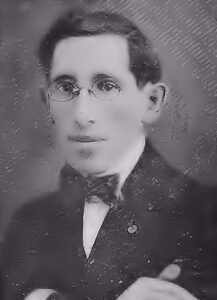 This Yizkor Book was published in New York in 1915, immediately after the events, written about, took place. It is an account of the author’s arrest, imprisonment in the Częstochowa prison and eventual release.
This Yizkor Book was published in New York in 1915, immediately after the events, written about, took place. It is an account of the author’s arrest, imprisonment in the Częstochowa prison and eventual release.
While this booklet is not, in the traditional sense, a “Yizkor Book”, and although it lacks historical information such as names etc., it opens up a fascinating window into an epoch, which has seldom been portrayed in other Yizkor Books. It, therefore, warrants its inclusion in our Project.
According to his entry in “Częstochowa Jews – A Biographical Dictionary”(Częstochowa, 2019): Mosze Cieszyński was a
“… journalist, bookseller and publisher. He was born on 8th October 1889 in Częstochowa, the son of Jakub, a fish trader, and Estera Fajgla née Gnendelman.
From 1912, he was the most important contributor to the Jewish press in Częstochowa, starting with the ‘Czenstochower Reklamenblat’, ‘Wochnblat’ and ‘Tageblat’.
“In 1914, together with other committee members of the Bakery Workers’ Union, he was arrested [by the Russian military police] for appearing at a union meeting and spent a couple of months in prison.
“[After his release], in 1914, shortly before the outbreak of the War, Cieszyński left for the United States … In 1915, in New York, his “Turme derinerungen” (“Prison Memoirs”) was published.
“In 1922, he settled in Chicago where he opened a bookshop, which became a centre for Jewish readers, writers and intelligentsia from all directions. Cieszyński also published articles on political, social and literary topics for quite a number of newspapers and magazines in Chicago, New York, Philadelphia, Toronto, Buenos Aires and in other places.”
This Yizkor book, in its entirety, has been professionally translated into English.
The professional English translation of this Yizkor book has been made possible by the financial support of the

Wolf Rajcher z”l and Dora Rajcher z”l were both Holocaust survivors from Częstochowa.
They were prisoners in both the “Big Ghetto” and the “Small Ghetto” and, until liberation, were slave labourers in HASAG-Pelcery. Following the War, they emigrated to Melbourne Australia.
Upon the passing of both his parents, their son, Andrew Rajcher, established this charitable fund in their memory.
ENGLISH TRANSLATION:
Dave Horowitz-Larochette
IMPORTANT NOTICE
While the English translation is available for download, it may not, either in part or as a whole, be distributed or published without the prior written permission of Andrew Rajcher, the copyright-holder of this English-language version of this Yizkor Book.
Resistance and Destruction in the Częstochowa Ghetto (<1952)
Resistance and Destruction in the Częstochowa Ghetto (<1952)
by Liber Brener
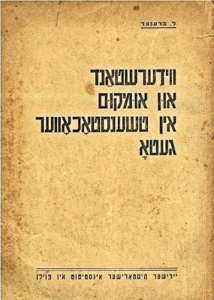 This Yizkor Book was published in Wrocław, Poland, prior to 1952.
This Yizkor Book was published in Wrocław, Poland, prior to 1952.
The introduction to this Yizkor Book states:
“This work by Liber Brener which we present, ‘Resistance and Destruction in the Częstochowa Ghetto’, is an expansion and an elaboration of a diary, which the author kept during a lengthy period in the ghetto and [labour] camp. Following liberation, L. Brener recovered these memoirs, revised them and complemented them with an array of German, Polish and Yiddish documents, as well as with testimonies from other surviving Jews from the Częstochowa Ghetto.”
Liber BRENER (1897-1986), was a teacher, social activist and chronicler. He was born on 4th November 1897 in Turzysk (Wołyń), the son of Naftali and Chana.
The Breners were a poor Chassidic family. His father was a gabbai (managing the court) of the son of the Turzysk tzaddik, Reb Dodie (Dawid Aron Twersk)i, later to become a tzaddik in both Żarki and Częstochowa. His mother owned a small stall selling flour.
After the war, Brener went to work for the Yiddish-Buch publishing house in Warsaw. He was the editor of books published, in Yiddish, for schools and adult readers. The Communist Party’s antisemitic campaign, in 1967 and 1968, forced Brener to leave Poland for Israel.
In translating this Yizkor Book, every effort has been made to translate, as accurately as possible, the Yiddish text and to transliterate (and double-check) the names of people and places as they would have been spelt in a historically, accurate manner (surnames may have been changed post-War). This includes the use of Polish diacritics where appropriate.
(Such care and research may not have been carried out in translations of this Yizkor Book appearing elsewhere.)
This Yizkor book, in its entirety, has been professionally translated into English.
The professional English translation of this Yizkor book has been made possible by the financial support of the

Wolf Rajcher z”l and Dora Rajcher z”l were both Holocaust survivors from Częstochowa.
They were prisoners in both the “Big Ghetto” and the “Small Ghetto” and, until liberation, were slave labourers in HASAG-Pelcery. Following the War, they emigrated to Melbourne Australia.
Upon the passing of both his parents, their son, Andrew Rajcher, established this charitable fund in their memory.
Chapters are listed in the order in which they appear in the Yizkor Book.
(The numbers in brackets, after each article, correspond to the appropriate page numbers in the Yizkor Book.)
Please note: Even though they are not listed above, pages 170-173 are actually NOT missing.
In the original text, these pages contain end-notes and a table of corrections,
which our translator has already incorporated into the above texts.
ENGLISH TRANSLATION:
Dave Horowitz-Larochette
IMPORTANT NOTICE
While the English translation is available for download, it may not, either in part or as a whole, be distributed or published without the prior written permission of Andrew Rajcher, the copyright-holder of this English-language version of this Yizkor Book.
Churbn Czenstochow (1949)
Churbn Czenstochow (1949)
"The Destruction of Częstochowa" - by Szlomo Waga
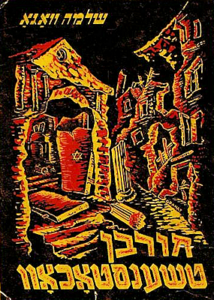 This Yizkor Book was published in Buenos Aires, in 1949, by the Central Union of Polish Jewry in Argentina [Unión Central Israelita Polaca en la Argentina].
This Yizkor Book was published in Buenos Aires, in 1949, by the Central Union of Polish Jewry in Argentina [Unión Central Israelita Polaca en la Argentina].
In his review of this book, published in the Czenstochov (1958) Yizkor Book, Dr. W. Gliksman writes:
“Szlomo Waga’s book is based mainly on personal experiences. In the book, no other sources or testimonies are presented other than the events which the author lived through himself and to which he was eye‐witness…..
Certain events, such as “Bloody Monday” for instance, which caused the author himself to become a ‘zakładnik’ [hostage], Waga describes more comprehensively. In others, he limits himself to a briefer account….
Waga also did not fail to note the moral descent of the elements which served in the police force. It is understood that the element, in general, is being dealt with here and not individual, good people ‐ exceptions. Waga witnessed the debauchery of the constables, high officials of the ‘Judenrat’ and similar servants [of the Nazis] at the city’s night locales, while the masses of people were starving. Here, above all, the martyrdom of the children emerges, who were the providers of livelihood for poor homes…..”
In translating this Yizkor Book, every effort has been made to translate, as accurately as possible, the Yiddish text and to transliterate (and double-check) the names of people and places as they would have been spelt in a historically, accurate manner (surnames may have been changed post-War). This includes the use of Polish diacritics where appropriate. (Such care and research may not have been carried out in translations of this Yizkor Book appearing elsewhere.)
This Yizkor book, in its entirety, has been professionally translated into English.
The professional English translation of this Yizkor book has been made possible by the financial support of the

Wolf Rajcher z”l and Dora Rajcher z”l were both Holocaust survivors from Częstochowa.
They were prisoners in both the “Big Ghetto” and the “Small Ghetto” and, until liberation, were slave labourers in HASAG-Pelcery. Following the War, they emigrated to Melbourne Australia.
Upon the passing of both his parents, their son, Andrew Rajcher, established this charitable fund in their memory.
Chapters are listed in the order in which they appear in the Yizkor Book.
(The numbers in brackets, after each article, correspond to the appropriate page numbers in the Yizkor Book.)
Translator’s Comment:
After reading this Yizkor book, it seems that Waga’s book ends rather abruptly. Just by reading it, one cannot but wonder what happened to the author, or indeed his wife and children, followng the massacre of the Częstochowa intellectuals on Purim 1943. His story is obviously just halfway told and there has to be more to it.
ENGLISH TRANSLATION:
Dave Horowitz-Larochette
IMPORTANT NOTICE
While the English translation is available for download, it may not, either in part or as a whole, be distributed or published without the prior written permission of Andrew Rajcher, the copyright-holder of this English-language version of this Yizkor Book.
Churban Czenstochow (1948)
Churban Czenstochow (1948)
"The Destruction of Częstochowa" - by Benjamin Orenstein
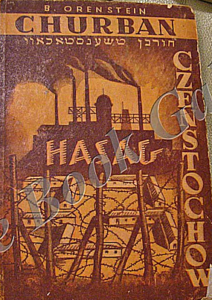 This Yizkor Book was published, in 1948, by the Central Administration of the Częstochower Landsmannschaft in the American Zone in Germany. Being published so soon after World War Two, when memories of the horrors are still fresh, it provides us with even more insights into the destruction of Częstochowa Jewry.
This Yizkor Book was published, in 1948, by the Central Administration of the Częstochower Landsmannschaft in the American Zone in Germany. Being published so soon after World War Two, when memories of the horrors are still fresh, it provides us with even more insights into the destruction of Częstochowa Jewry.
As Dr Filip Friedman states in the book’s Foreword:
The author set himself the task of encompassing the tragedy of the Częstochowa Jews as comprehensively as possible. He described it in the tone of the pulsating Jewish life in Częstochowa prior to the War. ….
I am sure that Orenstein’s work introduces much new information with the abundance of materials that he has gathered, with his comprehensiveness and descriptions and his systematic and transparent composition of the historical material. …..
It is a work which constitutes an important contribution to the historical research of the era of destruction, and is concurrently a worthy and earnest memorial to the Jewish community of Częstochowa …
In his introduction to the book, Dr Cwi Kantor writes:
… the book has been published in the Latin script. [In] this, the Central Administration has taken into account the fact that – to our great regret – there is still a great part of the Jews in Germany and overseas for whom it is difficult or who are completely unable to read any quadrilateral Yiddish letters.
[Webmaster: There are two Yizkor Books written with the same title – “Churban Czenstochow” – one by Szlomo Waga and, this one, by Benjamin Orenstein. As far as we know, this is the FIRST PROFESSIONAL, English-language translation of this book.]
This Yizkor book has been PROFESSIONALLY translated into English,
for the FIRST TIME, in its entirety!
The professional English translation of this Częstochowa Yizkor book has been made possible by the financial support of the

Wolf Rajcher z”l and Dora Rajcher z”l were both Holocaust survivors from Częstochowa.
They were prisoners in both the “Big Ghetto” and the “Small Ghetto” and, until liberation, were slave labourers in HASAG-Pelcery. Following the War, they emigrated to Melbourne Australia.
Upon the passing of both his parents, their son, Andrew Rajcher, established this charitable fund in their memory.
Click on PART No. HEADINGS to reveal chapters.
Chapters are listed in the order in which they appear in the Yizkor Book.
(The numbers in brackets, after each article, correspond to the appropriate page numbers in the book.)
ENGLISH TRANSLATION:
Dave Horowitz-Larochette
IMPORTANT NOTICE
While this English translation is available for download, it may not, either in part or as a whole, be distributed or published without the prior written permission of Andrew Rajcher, this English-language version copyright-holder.

